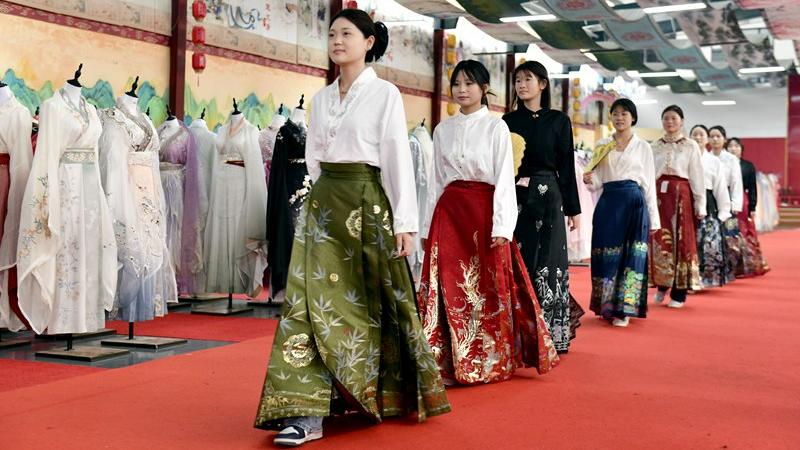Rediscovering Chinese entrepreneurs
This Spring Festival, or Chinese New Year, has been filled with exciting news.
As of Feb. 8, "Ne Zha 2," the animated feature, has already grossed 7 billion yuan (about $960 million), becoming the highest-grossing film of all time in China.
Meanwhile, the Chinese startup DeepSeek's artificial intelligence (AI) model took the world by storm, reshaping global views on AI development with its affordability and effectiveness.
A new wave of enthusiasm for innovation and entrepreneurship is surging in fields such as AI, biotechnology, commercial aerospace, and the cultural and creative industry. Let's take a look at Chinese entrepreneurs and the future they are shaping in China.
Are Chinese entrepreneurs only good at imitation?
At the 2024 Beijing International Automotive Exhibition, executives of foreign carmakers flocked to see China's domestically produced new energy vehicles.
In the past, Chinese cars were the subject of ridicule for their outdated designs and subpar craftsmanship. Nowadays, the development of key technologies such as Chinese automaker BYD's blade battery, NIO's permanent magnet synchronous motor, and GAC Group's super-fast charging technology, has propelled Chinese car companies onto the global automotive stage.
During the initial development phase of the internet in China, many entrepreneurs viewed imitation as a quick way to success. However, the days of "Copy to China" are over, and now "Copy from China" is becoming more prevalent. Innovative business forms in China's mobile internet such as live-streaming e-commerce, super apps, and social e-commerce are now being closely studied and emulated by global investors.
China ranked 11th among the world's most innovative economies in the Global Innovation Index 2024 released by the World Intellectual Property Organization. Emerging industries are thriving in areas such as new energy, new materials, bio-manufacturing, and commercial aerospace.
Are Chinese entrepreneurs too impetuous?
In August 2024, Chinese video game "Black Myth: Wukong" attracted over 1 million players within just one hour of launch. With stunningly realistic visual effects, an epic original soundtrack, emotionally gripping storytelling, and an immersive gameplay experience, the game became a global phenomenon.
Behind the success of the game is a startup company which invested over 100 million yuan and devoted six years to the game. The company's 100-person team journeyed to more than 100 locations nationwide, scanning and capturing traditional architecture and landscapes to authentically recreate them in the game.
The recently record-breaking "Ne Zha 2" followed the same path. After the first "Ne Zha" film became the highest-grossing Chinese animated film, the creators refused to rush a sequel. Instead, they spent an entire year perfecting just one 10-second scene for the sequel.
The pursuit of perfection is not only seen in today's young entrepreneurs. Zhang Ruimin, founder of China's top home appliance manufacturer Haier, smashed 76 faulty refrigerators to emphasize the importance of quality. Ren Zhengfei, founder of Chinese tech giant Huawei, has led the company for 38 years with a focus on the telecommunications sector. Wang Chuanfu, chairman and president of BYD, broke through traditional barriers in the automotive industry. Zhou Qunfei, who started out at factory that made glass for watches, is now chairwoman of Lens Technology.
Each of them is a forward-thinking visionary who continually challenges their own boundaries.
The quest for perfection has always been a shared spirit of innovation and entrepreneurship passed down through generations, not limited to any single era. Chinese companies, quality, and brands are reaching new heights thanks to the relentless determination of each generation of entrepreneurs.
Are Chinese entrepreneurs only looking to go public?
Roadshows, fundraising, IPOs… some may believe entrepreneurship is only a game of capital.
Consider though that the street vendor that sells you your breakfast in the morning, the repairman that visits your home to fix your appliances, and the livestreamer you purchase fruit from are all part of China's entrepreneurship landscape.
These individual entrepreneurs are just as much a part of China's entrepreneurial spirit as the big companies looking to go public.
The results of the fifth national economic census revealed that the number of self-employed units in China was about 88 million. Self-employed units, small and medium-sized enterprises, along with leading companies, together form the solid foundation of China's economy, characterized by stability, resilience, and immense potential.
Entrepreneurship is not just about tech unicorns—it thrives within enterprises and institutions as well. Many "intrapreneurs" operate within companies, driving innovation and transformation from within. They are the unsung heroes of corporate progress.
Even government departments are now embracing entrepreneurship. Shenzhen in south China's Guangdong Province is capitalizing on technological innovation, attracting global tech giants to establish a presence there. Hangzhou in east China's Zhejiang Province remains focused on AI, with companies like DeepSeek and Unitree making waves. Unitree's humanoid robot products put on a performance at the Spring Festival Gala 2025.
By providing policy support, integrating resources, and offering innovative services, many local governments are actively partnering with entrepreneurs.
Looking back, there have always been trailblazers aiming high, and every chapter of economic growth is marked by the determined steps of entrepreneurs. Today, it is undoubtedly the golden age for Chinese entrepreneurs!
Photos
Related Stories
- From Kong Fu master to master of business: An African youth's business adventure in China
- New entrepreneurs on Hurun China Rich List 2024 mainly from high-tech sector
- Entrepreneurs eye opportunities in northeast China's emerging industries
- Young entrepreneur brings new life to once-dormant land
- Initiative aids student entrepreneurs
- Second-generation entrepreneurs take up family business baton, seek innovation
- Forum held in Hainan to boost cooperation among Chinese entrepreneurs
- 2023 Boao Forum for Entrepreneurs held in Hainan
- Nigerian entrepreneur living her dream in Hainan
Copyright © 2025 People's Daily Online. All Rights Reserved.









